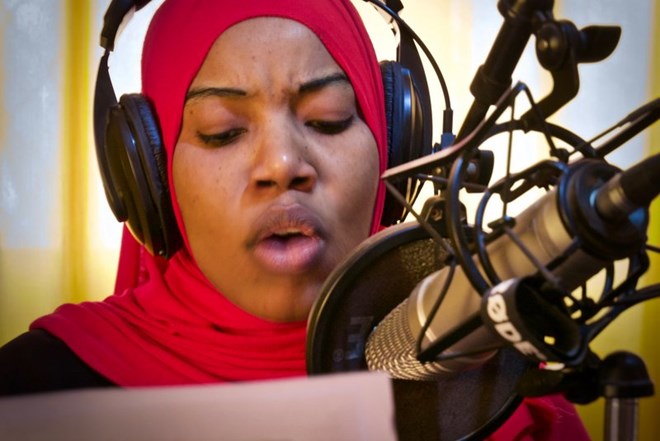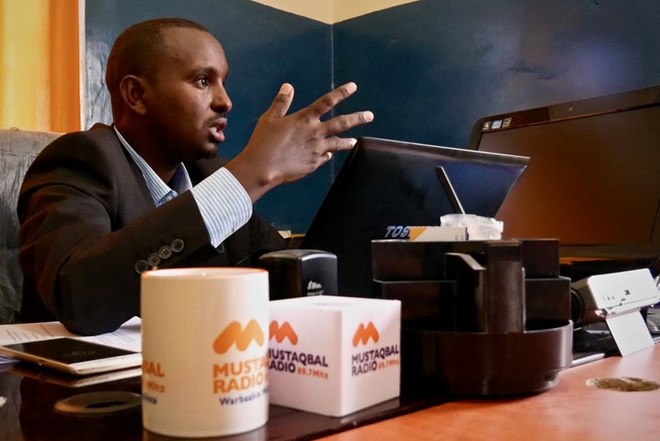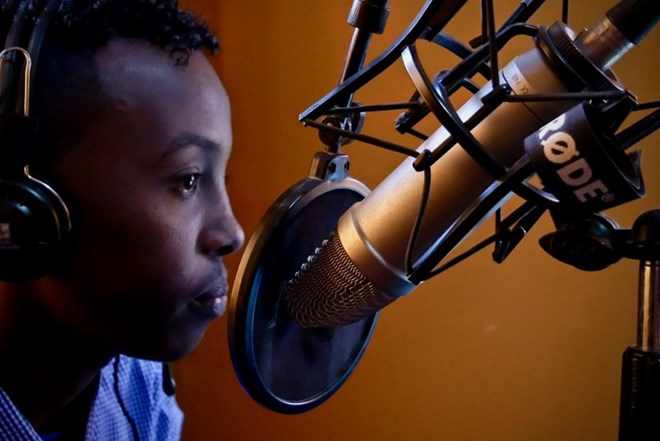
Friday January 19, 2018

Nasrin Mohamed Ali, head of production at the radio station, voiced one of the characters in the radio spots. The spots involved dramatization of everyday scenarios with a little mix of humour to deliver the message. CRC/ Abdikarim Mohamed
Voice actors gather in a radio studio in Mogadishu to create a public service announcement to help fight outbreaks of diarrhea and cholera.
“My wife is the jealous type. Of late, her cooking isn’t what it used to be,” Ali, one of two male characters, says jokingly to his friend, who is having him over for lunch.
Their playful tone abruptly stops when they notice there is water but no soap to wash their hands – one of the central themes the ads are trying to convey, that people must wash hands before eating to halt the spread of cholera.
The script is one of three 45-second radio spots being produced by Radio Mustaqbal, a radio station based in Somalia’s capital.
Health experts believe families in Somalia need to know three things to fight cholera: 1) Wash your hands with soap. 2) Ensure water is safe to drink by boiling it or using purifiers. 3) Visit SRCS clinics to contain the threat of these killer diseases.
The International Committee of the Red Cross (ICRC), together with the Somali Red Crescent Society (SRCS), is working with Radio Mustaqbal to produce the messages. The response to disease outbreaks like cholera and acute watery diarrhea has been limited to SRCS clinics and the ICRC cholera treatment centers in Kismayo and Baidoa. Door-to-door campaigns have also been carried out by the SRCS volunteers to promote hygiene. The volunteers distribute aquatabs to purify water, while also training families on the use of oral rehydration solutions.
By crafting radio spots around the three messages and broadcasting them in the different regions in Somalia, both organizations are taking the fight to contain the threat of communicable disease outbreaks to the airwaves.
“These messages are part of our preventive approach against these outbreaks. With radio we get to reach a greater audience at the household level,” said Laura May, who is in charge of the ICRC’s Primary Health Care Program in Somalia.

Ahmed Isse Gutale, programmer with Mustaqbal radio, was invovled in scripting the three radio spots on three main messages and the ICRC and SRCS is trying to promote: Wash hands with soap, drink safe water and visit SCRS clinics for antenatal care. PHOTO: ICRC / Abdikarim Mohamed
Despite the rainy season coming to an end recently, the threat of these water-borne disease outbreaks remain. In 2017, a drought year for Somalia, a total of 61 deaths were reported from cholera treatment centers and SRCS clinics in south and central parts of the country.
“Cholera and acute watery diarrhea are all-weather. Wet or dry, the threat is ever present,” Laura said.
But how do we get these important messages across? We go back to the radio studio to see.
“In the Somali culture, the word of a man has greater sway than other members in the household,” says Ahmed, “So a man was chosen to pass the message along.”
Both men in the first ad, Ali and Faarah, pause when they realize they have no soap to wash their hands with, leaving the impression that without soap, the hand-washing is not complete.
“It is important for whoever will be listening, be it in Middle Shabelle, Lower Shabelle, Hiraan and other regions, to be told why these habits are useful,” he adds, something that is evident in the second spot on drinking safe water.
Two female characters point out that water is not safe to drink if it has not been boiled or purified. The third spot, which also has a predominantly female cast, encourages visits to SRCS clinics located all across Somalia.
“With a bit of humour, the message tends to stick. Tomorrow, when the audience see someone washing their hands without using soap, they remember our message,” says Mohamed Abdulkadir, the radio actor who plays one of the men in the handwashing scene.
With the onset of the dry season and the risk of outbreaks of acute watery diarrhoea and cholera still present, hopefully the radio campaign voiced by these Somali actors will help keep the diseases at bay.

Abdullahi Hussein Omar, 20, played the role of a young boy in one of the radio spots. PHOTO: ICRC/ Abdikarim Mohamed